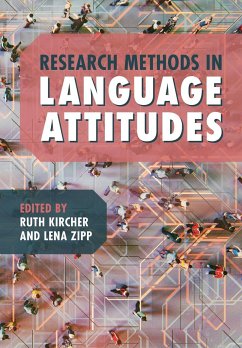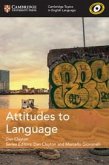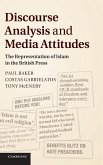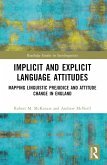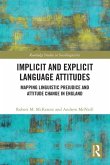Research Methods in Language Attitudes
Herausgeber: Kircher, Ruth; Zipp, Lena
Research Methods in Language Attitudes
Herausgeber: Kircher, Ruth; Zipp, Lena
- Broschiertes Buch
- Merkliste
- Auf die Merkliste
- Bewerten Bewerten
- Teilen
- Produkt teilen
- Produkterinnerung
- Produkterinnerung
This interdisciplinary book is the first to survey traditional and cutting-edge methods for the study of language attitudes. It helps readers choose a suitable research method, and guides them through planning and design, data collection and analysis. It is essential reading for researchers and students conducting research into language attitudes.
Andere Kunden interessierten sich auch für
![Cambridge Topics in English Language Attitudes to Language Cambridge Topics in English Language Attitudes to Language]() Dan ClaytonCambridge Topics in English Language Attitudes to Language30,99 €
Dan ClaytonCambridge Topics in English Language Attitudes to Language30,99 €![Discourse Analysis and Media Attitudes Discourse Analysis and Media Attitudes]() Paul BakerDiscourse Analysis and Media Attitudes114,99 €
Paul BakerDiscourse Analysis and Media Attitudes114,99 €![Counter-Stereotypes and Attitudes Toward Gender and LGBTQ Equality Counter-Stereotypes and Attitudes Toward Gender and LGBTQ Equality]() Jae-Hee Jung (University of Houston)Counter-Stereotypes and Attitudes Toward Gender and LGBTQ Equality22,99 €
Jae-Hee Jung (University of Houston)Counter-Stereotypes and Attitudes Toward Gender and LGBTQ Equality22,99 €![How to Negotiate Anything with Anyone Anywhere Around the World How to Negotiate Anything with Anyone Anywhere Around the World]() Frank L. ACUFFHow to Negotiate Anything with Anyone Anywhere Around the World21,99 €
Frank L. ACUFFHow to Negotiate Anything with Anyone Anywhere Around the World21,99 €![Implicit and Explicit Language Attitudes Implicit and Explicit Language Attitudes]() Robert M. McKenzieImplicit and Explicit Language Attitudes142,99 €
Robert M. McKenzieImplicit and Explicit Language Attitudes142,99 €![Attitudes to World Englishes Attitudes to World Englishes]() Hyejeong AhnAttitudes to World Englishes142,99 €
Hyejeong AhnAttitudes to World Englishes142,99 €![Implicit and Explicit Language Attitudes Implicit and Explicit Language Attitudes]() Robert M. McKenzie (UK Northumbria University)Implicit and Explicit Language Attitudes64,99 €
Robert M. McKenzie (UK Northumbria University)Implicit and Explicit Language Attitudes64,99 €-
-
-
This interdisciplinary book is the first to survey traditional and cutting-edge methods for the study of language attitudes. It helps readers choose a suitable research method, and guides them through planning and design, data collection and analysis. It is essential reading for researchers and students conducting research into language attitudes.
Hinweis: Dieser Artikel kann nur an eine deutsche Lieferadresse ausgeliefert werden.
Hinweis: Dieser Artikel kann nur an eine deutsche Lieferadresse ausgeliefert werden.
Produktdetails
- Produktdetails
- Verlag: Cambridge University Press
- Seitenzahl: 430
- Erscheinungstermin: 7. Juli 2022
- Englisch
- Abmessung: 244mm x 170mm x 24mm
- Gewicht: 758g
- ISBN-13: 9781108811668
- ISBN-10: 1108811663
- Artikelnr.: 63621314
- Herstellerkennzeichnung
- Libri GmbH
- Europaallee 1
- 36244 Bad Hersfeld
- gpsr@libri.de
- Verlag: Cambridge University Press
- Seitenzahl: 430
- Erscheinungstermin: 7. Juli 2022
- Englisch
- Abmessung: 244mm x 170mm x 24mm
- Gewicht: 758g
- ISBN-13: 9781108811668
- ISBN-10: 1108811663
- Artikelnr.: 63621314
- Herstellerkennzeichnung
- Libri GmbH
- Europaallee 1
- 36244 Bad Hersfeld
- gpsr@libri.de
1. An introduction to language attitudes research Ruth Kircher and Lena
Zipp; Part I. Analysis of the Societal Treatment of Language: 2. Discourse
analysis of print media Olivia Walsh; 3. Content analysis of social media
Mercedes Durham; 4. Discourse analysis of spoken interaction John Bellamy;
5. Analysis of communication accommodation Jakob Leimgruber; 6. Variable
analysis James Hawkey; Part II. Direct Methods of Attitude Elicitation: 7.
Semi-structured interviews Petros Karatsareas; 8. Focus groups Michael
Hornsby; 9. Questionnaires to elicit quantitative data Ruth Kircher; 10.
Questionnaires to elicit qualitative data Lena Zipp; 11. Perceptual
dialectology Chris Montgomery; Part III. Indirect Methods of Attitude
Elicitation: 12. The matched-guise technique Verónica Loureiro-Rodríguez
and Elif Acar; 13. The verbal-guise technique Marko Dragojevic and Sean
Goatley-Soan; 14. The theatre-audience method Tore Kristiansen; 15.
Experimental methods to elicit language attitudes among children Jasmine M.
DeJesus, Radhika Santhanagopalan, and Katherine D. Kinzler; 16. The
Implicit Association Test paradigm Laura Rosseel; Part IV. Overarching
Issues of Language Attitudes Research: 17. Researching language attitudes
in multilingual communities Bernadette O'Rourke; 18. Researching language
attitudes in signing communities Annelies Kusters, Maartje De Meulder, and
Erin Moriarty; 19. Researching language attitudes based on historical data
Anna D. Havinga and Andreas Krogull; 20. The use of priming in language
attitudes research Abby Walker, Katie Drager, and Jennifer Hay; 21.
Mixed-methods approaches to the study of language attitudes Ruth Kircher
and James Hawkey.
Zipp; Part I. Analysis of the Societal Treatment of Language: 2. Discourse
analysis of print media Olivia Walsh; 3. Content analysis of social media
Mercedes Durham; 4. Discourse analysis of spoken interaction John Bellamy;
5. Analysis of communication accommodation Jakob Leimgruber; 6. Variable
analysis James Hawkey; Part II. Direct Methods of Attitude Elicitation: 7.
Semi-structured interviews Petros Karatsareas; 8. Focus groups Michael
Hornsby; 9. Questionnaires to elicit quantitative data Ruth Kircher; 10.
Questionnaires to elicit qualitative data Lena Zipp; 11. Perceptual
dialectology Chris Montgomery; Part III. Indirect Methods of Attitude
Elicitation: 12. The matched-guise technique Verónica Loureiro-Rodríguez
and Elif Acar; 13. The verbal-guise technique Marko Dragojevic and Sean
Goatley-Soan; 14. The theatre-audience method Tore Kristiansen; 15.
Experimental methods to elicit language attitudes among children Jasmine M.
DeJesus, Radhika Santhanagopalan, and Katherine D. Kinzler; 16. The
Implicit Association Test paradigm Laura Rosseel; Part IV. Overarching
Issues of Language Attitudes Research: 17. Researching language attitudes
in multilingual communities Bernadette O'Rourke; 18. Researching language
attitudes in signing communities Annelies Kusters, Maartje De Meulder, and
Erin Moriarty; 19. Researching language attitudes based on historical data
Anna D. Havinga and Andreas Krogull; 20. The use of priming in language
attitudes research Abby Walker, Katie Drager, and Jennifer Hay; 21.
Mixed-methods approaches to the study of language attitudes Ruth Kircher
and James Hawkey.
1. An introduction to language attitudes research Ruth Kircher and Lena
Zipp; Part I. Analysis of the Societal Treatment of Language: 2. Discourse
analysis of print media Olivia Walsh; 3. Content analysis of social media
Mercedes Durham; 4. Discourse analysis of spoken interaction John Bellamy;
5. Analysis of communication accommodation Jakob Leimgruber; 6. Variable
analysis James Hawkey; Part II. Direct Methods of Attitude Elicitation: 7.
Semi-structured interviews Petros Karatsareas; 8. Focus groups Michael
Hornsby; 9. Questionnaires to elicit quantitative data Ruth Kircher; 10.
Questionnaires to elicit qualitative data Lena Zipp; 11. Perceptual
dialectology Chris Montgomery; Part III. Indirect Methods of Attitude
Elicitation: 12. The matched-guise technique Verónica Loureiro-Rodríguez
and Elif Acar; 13. The verbal-guise technique Marko Dragojevic and Sean
Goatley-Soan; 14. The theatre-audience method Tore Kristiansen; 15.
Experimental methods to elicit language attitudes among children Jasmine M.
DeJesus, Radhika Santhanagopalan, and Katherine D. Kinzler; 16. The
Implicit Association Test paradigm Laura Rosseel; Part IV. Overarching
Issues of Language Attitudes Research: 17. Researching language attitudes
in multilingual communities Bernadette O'Rourke; 18. Researching language
attitudes in signing communities Annelies Kusters, Maartje De Meulder, and
Erin Moriarty; 19. Researching language attitudes based on historical data
Anna D. Havinga and Andreas Krogull; 20. The use of priming in language
attitudes research Abby Walker, Katie Drager, and Jennifer Hay; 21.
Mixed-methods approaches to the study of language attitudes Ruth Kircher
and James Hawkey.
Zipp; Part I. Analysis of the Societal Treatment of Language: 2. Discourse
analysis of print media Olivia Walsh; 3. Content analysis of social media
Mercedes Durham; 4. Discourse analysis of spoken interaction John Bellamy;
5. Analysis of communication accommodation Jakob Leimgruber; 6. Variable
analysis James Hawkey; Part II. Direct Methods of Attitude Elicitation: 7.
Semi-structured interviews Petros Karatsareas; 8. Focus groups Michael
Hornsby; 9. Questionnaires to elicit quantitative data Ruth Kircher; 10.
Questionnaires to elicit qualitative data Lena Zipp; 11. Perceptual
dialectology Chris Montgomery; Part III. Indirect Methods of Attitude
Elicitation: 12. The matched-guise technique Verónica Loureiro-Rodríguez
and Elif Acar; 13. The verbal-guise technique Marko Dragojevic and Sean
Goatley-Soan; 14. The theatre-audience method Tore Kristiansen; 15.
Experimental methods to elicit language attitudes among children Jasmine M.
DeJesus, Radhika Santhanagopalan, and Katherine D. Kinzler; 16. The
Implicit Association Test paradigm Laura Rosseel; Part IV. Overarching
Issues of Language Attitudes Research: 17. Researching language attitudes
in multilingual communities Bernadette O'Rourke; 18. Researching language
attitudes in signing communities Annelies Kusters, Maartje De Meulder, and
Erin Moriarty; 19. Researching language attitudes based on historical data
Anna D. Havinga and Andreas Krogull; 20. The use of priming in language
attitudes research Abby Walker, Katie Drager, and Jennifer Hay; 21.
Mixed-methods approaches to the study of language attitudes Ruth Kircher
and James Hawkey.

